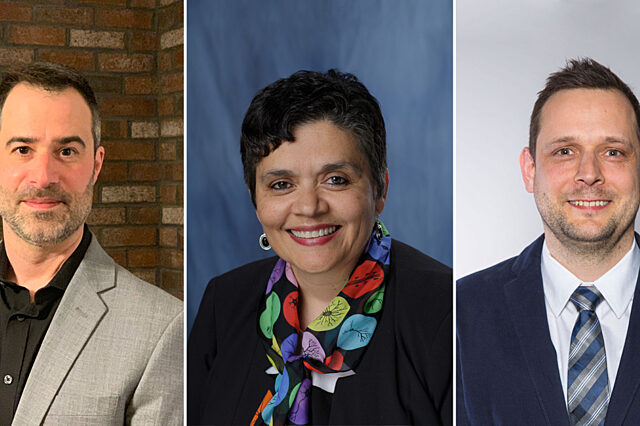Renowned neuroscientists to join UF Health, propel discovery of treatments for neurological diseases

Three renowned neuroscientists from top U.S. research institutions will join the newly established Norman Fixel Institute for Neurological Diseases at UF Health, a world-class medical hub at the University of Florida focused on the pursuit of new therapies to treat some of the most complex neurological diseases.
The three new researchers are:
- Malú G. Tansey, Ph.D., a professor of physiology and director of the Center for Neurodysfunction and Inflammation at Emory University School of Medicine
- Matthew LaVoie, Ph.D., an associate professor of neurology at Harvard Medical School and an associate scientist at Brigham and Women’s Hospital
- Stefan Prokop, M.D., a neuropathology fellow and research fellow at the Center for Neurodegenerative Disease Research at the Hospital of the University of Pennsylvania
They will begin their appointments at the onset of the 2019-20 UF academic year.
“We are thrilled to welcome Drs. Tansey, LaVoie and Prokop to accelerate our efforts to combat neurological diseases,” said David R. Nelson, M.D., interim senior vice president for health affairs at UF and president of UF Health. “These recruitments exemplify the University of Florida and UF Health’s commitment to becoming one of the world’s top destinations for neurological care, research and education.”
Tansey and LaVoie will relocate their labs to Gainesville, where they will collaborate with teams of neuroscientists at UF’s Evelyn F. and William L. McKnight Brain Institute and become the first endowed chairs of the Fixel Institute, established in January with a $20 million gift from the Lauren and Lee Fixel Family Foundation. Prokop will be the first designated Fixel Scholar. The Fixel Institute is focused on advancing research, technological innovation and clinical care for Parkinson’s disease and other neurodegenerative diseases, including Alzheimer’s disease, Lewy body dementia and ALS, as well as dystonia and concussions. The Fixel gift was part of a $100 million UF capital campaign to provide additional resources for scientists and physicians working to advance treatments for neurological disorders.
“Adding this caliber of talent to our faculty will help us push the boundaries of what’s possible,” said Joseph A. Tyndall, M.D., M.P.H., interim dean of the UF College of Medicine. “The impact of neurological diseases on patients and families cannot be overstated, and through collaboration with our talented neuroscientists already here on campus, these investigators will help lead us to new discoveries and train the next generation of neuroscientists.”
Tansey will join UF as a professor of neuroscience and neurology and will serve as director of UF’s Center for Translational Research in Neurodegenerative Disease, or CTRND, a state-of-the-art, multidisciplinary research center focused on the discovery of future treatments and diagnostics for neurological diseases that present an ever-increasing challenge to the aging American population. Upon his arrival later in the 2019-20 academic year, LaVoie will co-direct the CTRND with Tansey and serve as a professor and associate chair of research in the department of neurology and a professor of neuroscience.
Tansey’s lab focuses on the role of inflammation and immune system responses in brain health and the development of disease. She studies the cellular and molecular mechanisms underlying neuroinflammation in Parkinson’s disease, Alzheimer’s disease, frontotemporal dementia, ALS, autism spectrum disorders and depression, with a long-term goal of developing better therapies to prevent and treat these chronic disorders.
LaVoie’s research is dedicated to uncovering the early molecular patterns responsible for the unique neuropathology associated with Parkinson’s disease and related neurodegenerative disorders. The overarching goal of his work is to understand the basic biology of genes associated with familial Parkinson’s, the impact of their pathogenic mutations and how these findings can inform the etiology of sporadic disease and identify new therapeutic strategies to halt the disease process.
“Drs. Tansey and LaVoie are major scientists and thought leaders, and we are over the moon to have them as the first two endowed professorships as part of the overarching effort to recruit five top research teams to the Fixel Institute,” said Michael S. Okun, M.D., chair of the UF department of neurology and the institute’s executive director.
Prokop will serve as director of the UF Neuromedicine Brain Bank and in the future will transition to direct the core of the 1Florida Alzheimer’s Disease Research Center, a statewide effort to fight the disease that affects as many as 600,000 Floridians. Tissues in the brain bank are studied to support diagnoses of brain disorders and advance research efforts to understand the disease process. Prokop will also serve as an assistant professor of pathology, immunology and laboratory medicine and also of neurology.
“The institute seeks to train the next generation of clinician-scientists, and Dr. Prokop will be the first of many Fixel Scholars who will advance the mission of creating the resources necessary to confront neurological disease pandemics, such as Parkinson’s disease,” said Kelly D. Foote, M.D., co-director of the Fixel Institute.
Prokop’s research involves detailing the specific disease processes of Parkinson’s disease and Alzheimer’s disease, using traditional microscopic study, software-assisted image analysis and advanced analysis of gene expression and protein biochemistry.
“As the first wave of hires enabled by the generous gift from the Fixels, I think we truly hit the trifecta,” said Todd Golde, M.D., Ph.D., director of the McKnight Brain Institute of the University of Florida and founding director of the CTRND. “I have known Drs. Tansey, LaVoie and Prokop for many years. They are outstanding scientists and highly collaborative. They will bring novel skills, scientific acumen and an incredible amount of energy to neuromedicine research at UF Health. It’s a testament to our neuromedicine faculty and institutional leadership that these scientists chose to come to UF to continue their work.”
About the author
